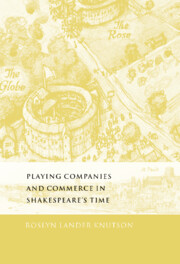Book contents
- Frontmatter
- Contents
- List of maps and tables
- Acknowledgements
- 1 Theatre history as personality
- 2 Players and company commerce
- 3 Playwrights, repertories, the book trade, and company commerce
- 4 Histrio-Mastix and company commerce
- 5 Hamlet and company commerce
- 6 Poetaster, Satiromastix, and company commerce
- 7 Conclusion: Hot Anger and company commerce
- Notes
- Bibliography
- Index
3 - Playwrights, repertories, the book trade, and company commerce
Published online by Cambridge University Press: 22 September 2009
- Frontmatter
- Contents
- List of maps and tables
- Acknowledgements
- 1 Theatre history as personality
- 2 Players and company commerce
- 3 Playwrights, repertories, the book trade, and company commerce
- 4 Histrio-Mastix and company commerce
- 5 Hamlet and company commerce
- 6 Poetaster, Satiromastix, and company commerce
- 7 Conclusion: Hot Anger and company commerce
- Notes
- Bibliography
- Index
Summary
Mr Henshlowe we haue heard their booke and lyke yt their pryce is eight poundes, wch I pray pay now to mr Wilson, according to our promysse, I would haue Come my selfe, but that I ame troubled wth a scytation.
yors Robt ShaaCuthbert Burby was the elder brother of Richard Burbadge, the great actor, and his name, as Cuthbert Burbidge, is sometimes so written in the Stationers' Registers …
John Payne CollierWilliam Shakespeare was unusual among fellow playwrights in that he wrote exclusively for one company for most of his career, acted in its offerings, and invested in its playhouses. He was therefore also unusual in having a direct stake in his company's commerce. His primary contribution to that commerce was to the repertory: each year he supplied the company with new plays that continued to be profitable when revived, taken to Court, and taken on tour. Many of those plays were further profitable as advertisements when they were printed with title pages naming the company. By a fortunate combination of commercial shrewdness and artistic inspiration, Shakespeare consistently chose subjects and dramatic formulas that attracted audiences. As in-house dramatist, he presumably also provided routine services such as prologues and epilogues for occasional performances, revisions for changes in venue or company personnel, and emendations to avoid censorship or facilitate a revival. It is therefore not surprising that old narratives of theatrical commerce placed Shakespeare and his company at the center.
- Type
- Chapter
- Information
- Playing Companies and Commerce in Shakespeare's Time , pp. 48 - 74Publisher: Cambridge University PressPrint publication year: 2001



